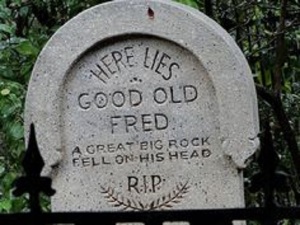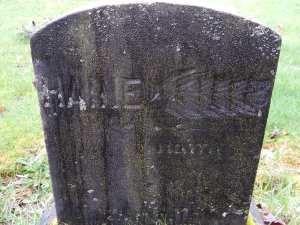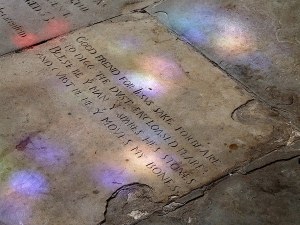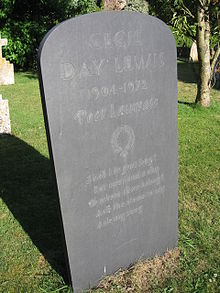 “Oh No.” A brief rhyme for a brief epitaph. Levity, brevity, but not longevity. “Oh no.” Not that these words adorn any grave that I can unearth. The shortest rhyming epitaph I have come across is that which appears on the Vancouver City Cemetery (Washington USA) grave of an atheist, Arthur J. Haine: Haine Hain’t. In preparing for his death and funeral, this Belgian born atheist wrote : Know everybody by these presents that I, Arthur Haine, knowing what I am about, make this my last will and testament…My funeral is to be of the cheapest kind and I don’t want my body to be transported but buried in the vicinity where I may die. As I have lived an infidel, I must be buried as such without any monkey business. When he died in 1907, his body, to the accompaniment of popular tunes played by a band, was carried to the cemetery in a beer truck along with several beer kegs for the refreshment of his friends and spectators. His epitaph was equally non-traditional. He designed his own tombstone and his own epitaph: Haine Hain’t. Sadly, I cannot post a picture of his original tombstone. Some of his “friends” were shocked at his grim levity and ordered the stone mason to erase the word Haint and carve a leaf design in its place. The present tombstone is available for viewing below.
“Oh No.” A brief rhyme for a brief epitaph. Levity, brevity, but not longevity. “Oh no.” Not that these words adorn any grave that I can unearth. The shortest rhyming epitaph I have come across is that which appears on the Vancouver City Cemetery (Washington USA) grave of an atheist, Arthur J. Haine: Haine Hain’t. In preparing for his death and funeral, this Belgian born atheist wrote : Know everybody by these presents that I, Arthur Haine, knowing what I am about, make this my last will and testament…My funeral is to be of the cheapest kind and I don’t want my body to be transported but buried in the vicinity where I may die. As I have lived an infidel, I must be buried as such without any monkey business. When he died in 1907, his body, to the accompaniment of popular tunes played by a band, was carried to the cemetery in a beer truck along with several beer kegs for the refreshment of his friends and spectators. His epitaph was equally non-traditional. He designed his own tombstone and his own epitaph: Haine Hain’t. Sadly, I cannot post a picture of his original tombstone. Some of his “friends” were shocked at his grim levity and ordered the stone mason to erase the word Haint and carve a leaf design in its place. The present tombstone is available for viewing below.
Suggested epitaphs that never were actually chiseled into stone include that of the poet, Ogden Nash, who, being straight to the point, suggested this pertinent gem for his tombstone: Nash’s Ashes. He died on May 19th, 1971. However his tombstone, as it now stands in the East Side Cemetery in North Hampton, Rockingham County, New Hampshire, merely contains his name and dates and, also, those of his wife, Frances.
In an earlier post – Tombstone Tropes 1 – I discussed and displayed a variety of literary epitaphs from the ancient Greeks to the modern day, and the modern dead. In this post I offer a broader sampling of the more humorous and the more demotic epitaphs to be found on tombstones worldwide. The emphasis is on brevity, wit and rhyme. I include a few photographs, some of them obviously staged and photoshopped, to illuminate and illustrate this universal genre. Should you wish me to include your own discoveries, or your own rhyming epitaph, please fill in the comment box below the post.

Brief Rhyming Epitaphs
Here lies Will Smith – and what’s something rarish,
He was born, bred, and hanged, all in the same parish.
***
Here lays Butch,
We planted him raw.
He was quick on the trigger,
But slow on the draw.
A tombstone in a Silver City, Nevada, cemetery
***
Reader if cash thou art
In want of any
Dig 4 feet deep
And thou wilt find a Penny.
John Penny’s epitaph in the Wimborne, England, cemetery
***
On the 22nd of June
Jonathan Fiddle
Went out of tune.
Read on a tombstone in a cemetery in Hartscombe, England
***
Owen Moore
Gone away
Owin’ more
Than he could pay.
The tombstone of Owen Moore in Battersea, London

Here lies the body
of Jonathan Blake
Stepped on the gas
Instead of the brake.
The tombstone of an accident victim in a Uniontown, Pennsylvania cemetery
Under the sod and under the trees
Lies the body of Jonathan Pease.
He is not here, there’s only the pod:
Pease shelled out and went to God.
On a grave from the 1880’s in Nantucket, Massachusetts
***
Mr. Partridge
died 1861
What! Kill a partridge in the month of May!
Was that done like a sportsman? eh, death, eh?
***
Here lies Martin Elginbrod,
Hae mercy on my soul Lord God,
as I would do were I Lord God,
and ye were Martin Elginbrod!
From a Scottish graveyard
***
The children of Israel wanted bread
And the Lord sent them manna.
Old clerk Wallace wanted a wife,
And the Devil sent him Anna.
The tombstone of Anna Wallace in a Ribbesford, England, cemetery
***
Underneath this pile of stones
Lies all that’s left of Sally Jones.
Her name was Lord, it was not Jones,
But Jones was used to rhyme with stones.
Found on a tombstone in Skaneateles, New York

On an infant eight months old
Since I have been so quickly done for,
I wonder what I was begun for.
***
Here I at length repose,
My spirit now at aise is ;
With the tips of my toes
And the point of my nose
Turned up to the roots of the daisies.
In Ballyporeen (Ireland) churchyard, on Teague O’Brian,
written by himself
***
Here lies John Auricular,
Who in the ways of the Lord walked perpendicular.
***
This corpse
Is Phoebe Thorp’s.
***
Two Irish epitaphs:-
Here lies the body of Jonathan Ground,
Who was lost at sea and never found.
—
He lived and died
By suicide.
On a coroner who hanged himself

Here lies the body of Thomas Proctor
Who lived and died without a doctor.
***
Lord Coningsby
Here lies Lord Coningsby, be civil,
The rest God knows — so does the devil.
***
On an architect
Lie heavy on him, earth, for he
Laid many a heavy load on thee.
***
Here lies poor stingy Timmy Wyatt,
Who died at noon and saved a dinner by it.
***
Death willed that Thomas Willing here should lie
Although unwilling he to die.
***
Here lies the body of Mary Ann Bent,
She kicked up her heels, and away she went.

Here lies a man that was Knott born,
His father was Knott before him,
He lived Knott, and did Knott die,
Yet underneath this stone doth lie.
The tombstone of John Knott in a Sheffield, England, cemetery
***
Sacred to the memory of Miss Martha Gwynn,
Who was so very pure within.
She burst the outer shell of sin.
And hatched herself a cherubim.
The tombstone of Martha Gwynn at St. Alban’s cemetery
***
Here lies old Caleb Ham,
By trade a bum.
When Caleb dyed the Devil cryed :
” Come, Caleb, come.”
The tombstone of Caleb Ham in a New Hampshire cemetery
***
Here, reader, turn your weeping eyes,
My fate a useful moral teaches ;
The hole in which my body lies
Would not contain one half my speeches.
The tombstone of Lord Brougham, an orator

I laid my wife beneath this stone
For her repose and for my own.
On a tombstone in Middlebury, Vermont
Don’t weep for me, Eliza dear,
I am not dead, but sleeping here.
As I am now so you must be,
Prepare for death and follow me.
The tombstone of one Eliza in Truro, Nova Scotia
***
Bill Blake
Was hanged by mistake.
The tombstone of Bill Blake in a Colorado cemetery
***
Here lies a man names Zeke.
Second fastest draw in Cripple Creek.
***
Here lies the body of Arkansas Jim.
We made the mistake, But the joke’s on him.
In the Boot Hill Museum, Dodge City, Kansas
***
Rab McBeth
Who died for the want
of another breath.
On a hanged man Rab McBeth (1791-1823)

Here lies Lester Moore.
Four slugs
From a forty-four.
No Les
No More.
The tombstone of gun-slinger, Lester Moore, a Wells Fargo station agent for Naco, Arizona in the cowboy days of the 1880’s. He is buried in the Boot Hill Cemetery in Tombstone, Arizona.
Here lies the body of
Thomas Kemp.
Who lived by wool
and died by hemp.
The tombstone of a hanged sheep stealer from Larne, Ireland
***
Here lies the body
Of Margaret Bent
She kicked up her heels
And away she went.
The tombstone of Margaret Bent in Winterborn Steepleton Cemetery, Dorsetshire
***
Here lies old Rastus Sominy
Died a-eating hominy
In 1859 anno domini
The tombstone of Rastus Sominy in Savannah, Georgia
***
She was not smart, she was not fair,
But hearts with grief for her are swellin’;
All empty stands her little chair:
She died of eatin’ water-mellon.
A tombstone in a New Jersey cemetery
***
Beneath this stone, a lump of clay,
Lies stingy Jimmy Wyatt.
Who died one morning just at ten
And saved a dinner by it.
A tombstone in Falkirk, England

Here lies the body of William Jay
Who died maintaining his right of way;
He was right, dead right, as he sped along,
But he’s just as dead as if he’d been wrong.
***
Here lies the body of our Anna
Done to death by a banana
It wasn’t the fruit that laid her low
But the skin of the thing that made her go.
The tombstone of Anna Hopewell in Enosburg Falls, Vermont
***
Hooray my brave boys
Lets rejoice at his fall.
For if he had lived
He would have buried us all.
The tombstone of a gravedigger
***
Beneath this stone, in hopes of Zion,
Doth lie the landlord of the Lion;
His son keeps on the business still,
Resigned unto the heavenly will.
On the tombstone of an innkeeper, 1875
***
Tom Smith is dead, and here he lies,
Nobody laughs and nobody cries;
Where his soul’s gone, or how it fares,
Nobody knows and nobody cares.
On a tombstone dated 1742 in Newbury, England

Stranger tread
This ground with gravity.
Dentist Brown
Is filling his last cavity.
The tombstone of a dentist in Edinburgh, Scotland
***
Captain Thomas Coffin
Died 1842, age 50 years.
He’s done a-catching cod
And gone to meet his God.
The tombstone of a fisherman in New Shoreham, Rhode Island
***
Here lies Ann Mann,
Who lived an old maid
But died an old Mann.
December 8, 1767
The tombstone of Ann Mann in London, England
***
Here beneath this stone we lie
Back to back my wife and I
And when the angels trump shall trill
If she gets up then I’ll lie still!
On a tombstone in Barlinine Cemetery, Glasgow
***
They abounded in riches
But she wore the britches …
On a tombstone in Essex, England
***
This stone was raised by Sara’s Lord
Not Sara’s virtues to record
For they are known to all the town.
This stone was raised to keep her down.
On a tombstone in Kilmurry Churchyard, Ireland

Here lies the body of poor Aunt Charlotte.
Born a virgin, died a harlot.
For 16 years she kept her virginity
A damn’d long time for this vicinity.
On a tombstone in Death Valley, California
***
Cold is my bed, but oh, I love it,
For colder are my friends above it.
On a tombstone in Calvary Cemetery, Chicago
***
Beneath this stone a lump of clay
Lies Uncle Peter Dan’els
Who early in the month of May
Took off his winter flannels.
On a tombstone in Edinburgh, Scotland
***
Here lieth Mary, the wife of John Ford
We hope her soul has gone to the Lord
Bur if for Hell she has changed this life
She had better be there than John Ford’s wife.
On a grave dated 1790 in Potterne, Wiltshire, England
***
All who come my grave to see
Avoid damp beds and think of me.
On the tombstone of Lydia Eason, St Michael’s, Stoke-on-Trent, England
***
Here lie I by the chancel door:
They put me here because I was poor.
The further in, the more you pay,
But here I lie as snug as they.
On the tombstone of Robert Phillip, a gravedigger, in the church of St. Edmund the Martyr, Kingsbridge, Devon

HAINE
HAIN’T
On the tombstone of an atheist,
Arthur Haine,
in Vancouver, Washington
(See the introduction to this post above)
Here lies the body of
Jane Gordon
With mouth almighty
and teeth accordin!
On a tombstone in Marblehead, Massachusetts
***
Reader, I’ve left this world, in which
I had a world to do;
Sweating and fretting to get rich:
Just such a fool as you.
On a tombstone in Charleston, South Carolina
***
Here lies the body of Mary Ann Lowder
She burst while drinking a Seidlitz powder.
Called from this world to her heavenly rest,
She should have waited till it effervesced.
On a tombstone in Burlington, Vermont
***
Here lies, praise God, a woman who
Scolded and stormed her whole life through:
Tread gently o’er her rotting form
Or else you’ll raise another storm.
On a tombstone in Cookstown, Co. Tyrone
***
Death appeared in lovely form,
To bring the calm and end the storm.
***
Within this grave do lie
Back to back, my wife and I;
When the last trumpet the air shall fill,
If she gets up, I’ll just lie still.
Sacred to the memory of Elisha Philbrook and his wife Sarah
***
He sped himself to an early grave
Never to enjoy the time he saved.
On the tombstone of a young Irish man in Canada with a fondness for motorbikes

Ma loves Pa – Pa loves women
Ma caught Pa, with 2 in swimmin.
Here lies Pa.
First a Cough
Carried Me Off
Then a Coffin
They Carried Me Off In
On a tombstone in Boston, Massachusetts
***
His foot is slipt
and he did fall.
“Help; Help” he cried
and that was all.
On the tombstone of Joseph Crapp in Mylor Churchyard, Cornwall, England
***
Poorly lived,
And poorly died,
Poorly buried,
and no one cried.
Found by Nathaniel Hawthorne on a tombstone in Lillington churchyard, near Lemington Spa
***
Here lies the father of 29
He would have had more
But he didn’t have time.
***
Here lies one Thomas Foote
Whose bones may hundreds save
For death now has one foot
Entombed within the grave.

LINKS
Tombstone Tropes 1 – Brief Literary Epitaphs.
Funny Epitaphs
Some Funny Epitaphs from Real Tombstones.
Clever Epitaphs on Pinterest.
The HubPages collection of funny and bizarre epitaphs.
Irish Grave Humour by Raymond Lamont-Brown.

 Derek Mahon (born 23 November 1941) is an Irish poet from Belfast in Northern Ireland, the only child of working-class, Church of Ireland, parents. After Skegoneill Primary School, he attended the Royal Belfast Academical Institution, where he started writing and publishing poems, was involved in amateur dramatics, and participated in debates. He matriculated in Trinity College Dublin to read English, French and Philosophy. In 1965, he won an Eric Gregory Award, and three years later published his first full collection, Night Crossing. During these years, he travelled a great deal: England, France, Belgium, Germany, Canada, and the USA. He worked for Vogue, the New Statesman, and the BBC, but could never really hold down a regular job. Night Crossing (1968) was followed by numerous collections which include Lives (1972), The Snow Party (1975), Poems 1962–1978 (1979), The Hunt by Night (1982), Antarctica (1985), Selected Poems (1991), The Yaddo Letter (1992), and The Yellow Book (1997). Recent collections include Harbour Lights (2006) winner of the Irish Times Poetry Now Award, Somewhere the Wave (2007) and Life on Earth (2008), which won another Irish Times Poetry Now Award and was shortlisted for the prestigious Griffin Poetry Prize. Mahon’s 2010 collection, An Autumn Wind was praised by Paul Batchelor in the Guardian for its sophistication, technical prowess and willingness to address contemporary themes, including environmental degradation.
Derek Mahon (born 23 November 1941) is an Irish poet from Belfast in Northern Ireland, the only child of working-class, Church of Ireland, parents. After Skegoneill Primary School, he attended the Royal Belfast Academical Institution, where he started writing and publishing poems, was involved in amateur dramatics, and participated in debates. He matriculated in Trinity College Dublin to read English, French and Philosophy. In 1965, he won an Eric Gregory Award, and three years later published his first full collection, Night Crossing. During these years, he travelled a great deal: England, France, Belgium, Germany, Canada, and the USA. He worked for Vogue, the New Statesman, and the BBC, but could never really hold down a regular job. Night Crossing (1968) was followed by numerous collections which include Lives (1972), The Snow Party (1975), Poems 1962–1978 (1979), The Hunt by Night (1982), Antarctica (1985), Selected Poems (1991), The Yaddo Letter (1992), and The Yellow Book (1997). Recent collections include Harbour Lights (2006) winner of the Irish Times Poetry Now Award, Somewhere the Wave (2007) and Life on Earth (2008), which won another Irish Times Poetry Now Award and was shortlisted for the prestigious Griffin Poetry Prize. Mahon’s 2010 collection, An Autumn Wind was praised by Paul Batchelor in the Guardian for its sophistication, technical prowess and willingness to address contemporary themes, including environmental degradation.






















